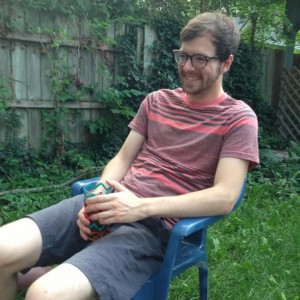Searching for Universal Truth – Nathan Lusk and Sarah Are
It’s very likely that in 2064 the Presbyterian Church will be searching for truth.
Hopefully, there are a lot of reasons for this search, but the main motivation is that we will have fully emerged as a global postmodern society. If none of that made sense, what you need to know is that Western Christianity and Western Culture has long been guided by a belief in objective absolute truth that helps us determine right from wrong. We will soon reach an age where everything is relative and based on experience. In the next 50 years geographical, cultural, and social barriers will continue to fall as technology brings us closer together. We are and will be exposed to more religions, faiths, and ideas than any generation before us. In this context, it is important for the Church to express the universal message of the Gospel, not an absolute message of theology.
The Protestant Reformation arose and spilt over the search for absolute truth. Schisms, persecutions, and executions occurred over seemingly small theological differences. The momentum behind this movement was rooted in the belief in the existence of divine truths in addition to absolute truths; that to deny one particular theology was to deny God and even salvation. This has been a debate throughout the history of Christianity and it is true even today: the inherency of Scripture and the exclusivity of Christ are both very real debates, shaping the entire Church as a whole.
The uncomfortable reality is that it’s not our place to know absolute divine truth. God is both a paradox and a mystery. This forces us into a posture of both humility and obedience. If we don’t assume this position we will seek leaders and pastors who are more interested in defining God than being in relationship with Him. We will be more interested in excluding people based on doctrine than including people based on grace. This cannot be stressed enough: The Church will lose its way when it claims to know all the answers. We must realize that the authority of God and the authority of Scripture is not based on our authority over others. We cannot dictate another’s relationship with God. Because our God is relational, He is also contextual and situational. He will reveal himself in ways we will never understand.
As our world becomes more secular and diverse, it is my wish that we will react with grace instead of judgment. It seems that, for most of my life, the Christian narrative in America has been controlled by those who seek an absolute theology, where they are the gatekeepers of God’s presence and our salvation. We see this in the obsession of being saved or being “right” with God. We see this in culture wars and having to believe in five exact things to guarantee our salvation. There is no checklist. In fact Jesus made a concerted effort to do away with checklists, because he saw how destructive they were, both to our relationship with him and our relationship to the Church. It’s important to recognize these leaders as our contemporary Sadducees and Pharisees: claiming the authority of God when they are really just claiming power for themselves.
Most important of all we need to love. We need to love the fundamentalists in the Bible Belt and the liberal elitists in New England. Between now and 2064 America will become more and more polarized and I fear that the American Church is going to play a significant role in the polarization process. Our churches are some of the most segregated places in the country based on race and class. Will PCUSA become even more defined as a place for progressive, upwardly mobile whites, or will it actively seek a diverse body of believers? This is not an easy thing to do. It means pushing our congregations to visit parts of town they’re not accustomed to and engaging with people in often uncomfortable settings. In this, we need to realize that relationships are far more powerful than initiatives. Serving someone at a soup kitchen is very different than inviting them to your home to break bread with you. Reconciliation will need to be a focus of the church going forward, as our world becomes more fragmented and isolated.
It is my hope that the Presbyterian Church will continue to spread the Gospel in a way that is displayed not in the words we speak but in the way we live. A Gospel that isn’t about the fear of Hell or the escapism of Heaven, but the Kingdom here on Earth. One that is holistic and humble, and most of all, one that seeks God in everything.
To be honest, I have no idea what the Presbyterian Church will look like in 2064. My hope is that it will still be searching for truth.
In 50 years, a lot can happen. Female shoulder pads will likely make a rebound. Hybrid cars will likely be a thing of the past, and Americans will very likely continue to eat too much sugar and salt. It is impossible to predict what changes will occur in the next 50 years, but one thing I know to be true, is time never stops moving.
If time never stops moving, the ideal reaction seems to be, to feel that rhythm and to never stop dancing along with it. Unfortunately, many in society, particularly my young adult cohort, think that the Presbyterian Church (USA) has not only stopped dancing, but many doubt that we can hear the music at all. They think we are stuck.
As one born and raised by the love of the Presbyterian Church, I know that the church not only feels life’s rhythm, but we feel it like a heartbeat. I know that the church has something to offer that can move people in a way nothing else can. And although the church will look different in 50 years, I have confidence that the church will continue to listen to the Earth’s rhythm, and try to match it with a melody of grace.
So, although I cannot predict what the world or the Church will look like in 50 years, this is what I believe. I believe in 50 years, the Presbyterian Church (USA) will be a source of community and relationships that the world craves. I believe the church will derive its energy and cultural legitimacy from that communal emphasis, and I believe that those relationships will write harmonies to the rhythm of life we are already running to. That is what I believe.
…
When I was young I started designing my “dream house” (some girls plan their wedding, I fantasized about building and decorating homes?). The first fantasy that always came out of my mouth was a front porch, quickly followed by a library, window seats, and a fireplace, of course.
I may have wanted a front porch because my dollhouse had a front porch, or because Nancy Drew used to read on her front porch. However, I think the true reason I wanted a veranda lay in something much deeper. As the little girl in a sundress and pigtails, I could not express this value, but I had seen enough movies and spent enough time at my grandmother’s house, to know that the front porch meant community. You swing on swings and watch the rain on the front porch. You spit watermelon seeds and husk corn on the front porch. You visit and catch fireflies on the front porch, and back in the day, one could wave to their neighbors and offer words of support from the front porch.
Today, I live in Richmond, Virginia, a city known for its row houses. Despite entire neighborhoods sharing walls, the notion of knowing your neighbor, visiting together, and being community by proximity, has been lost.
According to research, American society today is more fragmented and lonely than we have ever been. One quarter of Americans claim that they do not have a close individual with whom they can discuss personal or troubling matters with; and 50% of those individuals that do have a support person, only find support in their spouse (Vedantam, 2006). In 2006, only eight percent of people reported counting on their neighbor for any form of support (Vedantam, 2006). Similarly, when we compare the year 1965 to today, Americans go to 60% fewer picnics, and enjoy 40% less family meals together (Vedantam, 2006).
We may have hundreds of friends on Facebook, and e-mail dozens of individuals per day, but when it comes to the matters on our hearts, too many of us walk alone.
I remember in elementary school, my best friend’s dad got up and left in the middle of the night. He never came back. We cried on the playground, and as 8 year-olds, with hands too small to pour milk into our own cereal bowls, we sat together, hand in hand, and tried to make sense of such heartache.
I distinctly remember on that day thinking that if anything ever happen to my parents – whether that be death or heartbreak – that although the grief would be overwhelming, I would be ok. It occurred to me then that my little brother and I would never have to be alone, because in times of need the church would immediately surround us in love, carrying us until we were strong enough to walk. It was what I had seen time and time again, it’s what I trusted, and it’s why my family called the church the “church house”- because that kind of love makes a home.
…
The common complaint in my generation today seems to be that people are spiritual, but they are tired or frustrated with the church. I can understand that complaint, because often, those people are right. The church has done some embarrassing and disappointing things. We preach love, but we have not loved everyone. We preach humility and grace, but we too easily forget.
However, as society moves further and further into the realm of isolation, with higher rates of depression, suicide, and divorce, I think the church can serve as a light in the darkness. We may not have it all figured out. Claiming Christianity does not omit mistakes or prevent us from falling. However, in 50 years, I believe that the church is still going to be trying to love one another as best as we can, and will continue to value community and knowing one another by name, whether or not front porch connecting ever makes a rebound.
Our society is less connected than we were 50 years ago, however I do not for a second believe that the craving in each of us to know and be known, to love and to be loved, has decreased. Thus, I pray that the church can continue to be a source of energy, connection, support, and harmony. I believe that it is demonstrating those types of meaningful connections and relationships that will set the church apart, and in 50 years, could still be the best source of relief for many who are wandering.
In 50 years a lot can happen. However, in 50 years, my plan is to have lots of white hair and smile lines. In 50 years, my plan is to be singing harmony with those sharing my church pew. And in 50 years, I plan to know those people’s names, because the church is a home, because God loves all God’s children, and because deep down, we all need to be known. We are running to the rhythm of a busy world. Let us not forget the value of what it means for two or more to gather.
Amen.
Response Jessie Light
I wonder what it really looks like for a Christian denomination to stop trying to “know all the answers”. How might the PC(USA) faithfully discern specific and measurable action steps as a denomination while also living into the idea that we can never fully understand the will of God?
Response Geoff Wehmeyer
Nathan’s meditation on the church’s response to growing global awareness makes me think about the ways in which our generation’s reading of scripture might differ from some interpretations of the past. How do you think the church of 2064 will understand the role of scripture in their lives?
Response Caroline Barnett
Nathan: It’s true- sometimes it is not our place to know the details of God, only to continue to search. It is a search that is often filled with mistakes, stumbles, and a loss for words, but like Nathan says, we must continue to live each day with love and humility as our guiding forces. Bearing in mind the common perception of the church as judgmental and more concerned with doctrine rather than real people, how can we change these stereotypes?
Sarah: While we tend to get caught up in the debates over theology and the problems with the institution, sometimes we do forget one of the core missions of the church: building a community in which all are welcomed and loved. How can we continue to hold on to this sense of community as the world, and the Church, continues to fracture? And furthermore, how can we embrace new ways of community (such as online forums/support groups) that keep us together despite physical barriers?
Response Owen Gray
Since so much of society has embraced relativism, there’s no doubt that we will have to move forward with an attitude of love towards absolutist Christians who will understandably feel their faith being attacked. Can each of us think of a person or two who could benefit from hearing faithful and loving words about how we understand truth?
Nathan Lusk is a fellow pilgrim currently living in an intentional Christian community in Surrey, British Columbia, with his wife Lauren. He is in an internship focused on sustainable agriculture and hopes to use what he learns about creation to have a more holistic life.
Sarah Are is studying Social Work at Virginia Commonwealth University, with an expected graduation of May 2014. Following graduation, Sarah plans to attend seminary, starting in September of 2014, in pursuit of a Masters of Divinity. Currently, Sarah serves as the Director of VCU’s oldest co-ed a cappella group, The Notochords, and works part time as the Youth Director at Westminster Presbyterian Church.




Pingback: My hope for the church of 2064 | Nourish